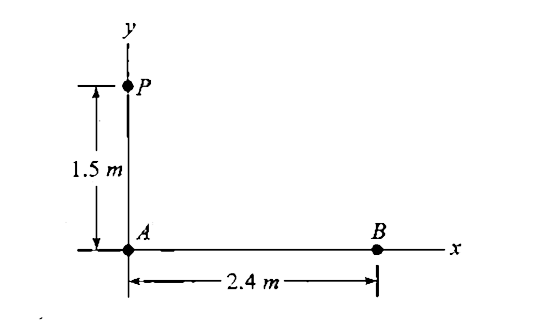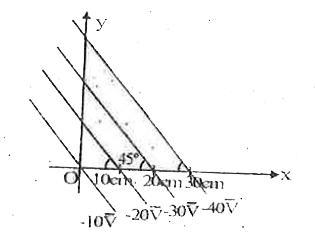A particle of mass 1 kg is released from rest at a point where gravitational potential is 5 J/kg. After some time, it passes through a point B with a speed of 1 m/s. What is the gravitational potential at B ?
As the particle moves from A to B, its kinetic energy increases.
So, its potential energy at B must be less than its potential energy at A. By conservation of mechanical energy energy we obtain
KA+UA=KB+UB
0+UA=12×1×(1)2+UB
⇒UA−UB=0.5
Dividing both sides by mass of the particle
UA−UBm=0.51 J/kg.
⇒VA−VB=0.5 J/kg.
⇒VB=4.5J/kg(∵VA=5J/kg)
Topper's Solved these Questions
- GRAVITATION BOOK - AAKASH INSTITUTECHAPTER - GRAVITATION EXERCISE - Try Yourself
33 Videos
- GRAVITATION BOOK - AAKASH INSTITUTECHAPTER - GRAVITATION EXERCISE - ASSIGNMENT SECTION -A (Objective Type Questions (one option is correct))
50 Videos
- ELECTROSTATIC POTENTIAL AND CAPACITANCE BOOK - AAKASH INSTITUTECHAPTER - ELECTROSTATIC POTENTIAL AND CAPACITANCE EXERCISE - ASSIGNMENT SECTION - D
13 Videos
- KINETIC THEORYBOOK - AAKASH INSTITUTECHAPTER - KINETIC THEORYEXERCISE - EXERCISE (ASSIGNMENT) SECTION - D Assertion - Reason Type Questions
10 Videos
Similar Questions
A particle of mass m and positive charge q is released from point A. Its speed is found to be v when it passes through a point B. which of the two points is at higher potential ? What is the potential difference between the points?
View SolutionA particle of mass m and positive charge q is released from point A. Its speed is found to be v when it passes through a point B. which of the two points is at higher potential ? What is the potential difference between the points?
View Solution
Knowledge Check
A particle of mass 5 kg is placed in a field of gravitational potential
v=(7x2−21x)J/kg . Then its motionAis SHM with angular frequency 1.67rad/sBis SHM with angular frequency 3.74rad/sCIs oscillarotry but no SHMDis SHM with amplitude 5.5mFrom the figure, the gravitational potential at '0' due to three point masses is
AGml(2+1√2)BGml(√+12)C3GmlD2GmlA satellite of mass 50 kg moves from a point where the gravitational potential due to the Earth is −20MNkg−1 to another point where the gravitational potential is −60MJkg−1.During the change of position, it has moved
AClose to the Earth and lost 2000 MJ of potential energyBCloser to the Earth and lost 20 MJ of potential energyCFarther from the Earth and gained 2000 MJ of potential energyDFarther from the Earth and gained 40 MJ of potential energy
The gravitational field intensity at a point 10 × 103 km from the centre of the earth is 4.8 N kg−1 . The gravitational potential at that point is
View SolutionTwo small bodies of masses 2.00 kg and 4.00 kg are kept at rest at a separation of 2.0 m. Where should a particle of mass 0.10 kg be placed to experience no net gravitational force from these bodies? The particle is placed t this point.What is the gravitational potential energy of the system of three particle with usual reference level?
View SolutionIn figure-6.105, particle A has a mass of 1.4 and particle B has a mass of 3.1kg. What is the gravitational field at point P ?

View SolutionThe gravitational field strength →E and gravitational potential V are releated as
→E=−(δVδxˆi+δVδyˆj+δVδzˆk)

In the figure, transversal lines represent equipotential surfaces. A particle of mass m is released from rest at the origin. The gravitational unit of potential , 1→V=1cm2/s2
Speed of the particle (v) (y is in cm and v in cm/s) as function of its y-co-ordinate is
View SolutionThe gravitational potential due to earth at infinite distance from it is zero. Let the gravitational potential at a point P be −5Jkg−1. Suppose, we arbitrarily assume the gravitational potential at infinity to be +10Jkg−1, then the gravitational potential at P will be
View Solution